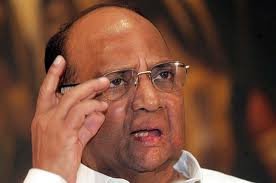
New Delhi, July 20: 11:15 am: The UPA is reportedly making all possible efforts to placate Nationalist Congress Party (NCP) chief Sharad Pawar after he and party leader Praful Patel sent their resignation letters to the Prime Minister. The Congress has said that the NCP is important to it.
"Pawar has supported Pranab Mukherjee, he is an important person. The NCP is important to us and ll our allies are intact," Congress leader Jagdambika Pal said.
10:45 am: It is being said that the UPA is not following the coalition dharma and is ignoring smaller allies. Sharad Pawar has now red-flagged the issue and has, in a way, asked the UPA to be serious about smaller allies.
10 am: The UPA is likely to accommodate some demands of Nationalist Congress Party (NCP) chief Sharad Pawar, according to sources. Sharad Pawar, in his meeting with UPA Chairperson Sonia Gandhi, conveyed his displeasure.
Sharad Pawar is reportedly angry at being superseded for the number two position in the Union Cabinet. However, Congress sources claim that the number two position in the Cabinet is not an issue and say the government will take up some of Pawar's demands like forward contracts soon.
9:30 am: Nationalist Congress Party (NCP) chief Sharad Pawar, who resigned from the Cabinet late on Thursday night, met UPA Chairperson Sonia Gandhi on Friday morning.
Nationalist Congress Party (NCP) chief Sharad Pawar and party member Praful Patel on Friday sent in their resignations to Prime Minister Manmohan Singh, sources said. The duo were said to be upset over the NCP chief not being made the number two within the UPA government.
The duo had said they will not attend their offices on Friday. Pawar and Patel sent their resignation letters to Prime Minister Manmohan Singh late on Thursday night. However, the letters have been written in a manner that leaves a window of opportunity open for the UPA as it provides a scope for negotiations.
This may be seen as a trouble for the UPA as the NCP has been one of the most reliable allies of the UPA as it has supported the UPA in important situations. The NCP was among one of the first parties to support UPA candidate Pranab Mukherjee in the Presidential poll. Therefore, the UPA is likely to make efforts to placate Pawar.
The UPA has two options. They can either give the number two position to Pawar, as he desires, or they can make him the Leader of the Lok Sabha. The UPA core committee will meet later on Friday and may chalk out a plan to placate Pawar and Patel.
In fact, for a second time on Thursday, Pawar and Patel had skipped the Cabinet meeting despite the fact that on agenda was a matter relating to Pawar's ministry.
Sources said the rift was over the number two slot. With Pranab Mukherjee gone, Pawar, as per seniority, should have been made number two.
Congress, however, argued that the NCP had only nine MPs while Congress was the largest constituent of the UPA and hence could choose the number two. It's Defence Minister AK Antony who got the slot. This upset the NCP.
NCP sources also said Pawar was upset by the Congress's witch-hunting and lack of gratitude.
Pawar is believed to have been angry that some of his nominees for the Governor's post and for chairmanship of NABARD and NAFED were rejected. Certain projects with which Sharad Pawar was involved were not cleared by government. Also, he accused the Cabinet of dragging its feet over forward trading.




Comments
Add new comment